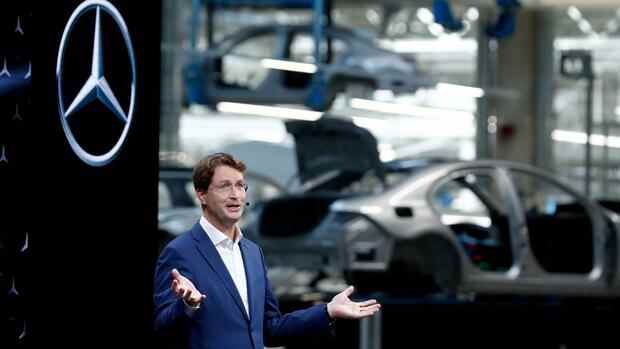The automaker urgently needs to improve its green record.
(Photo: Reuters)
Munich Mercedes-Benz shareholders are torn. On the one hand, they are celebrating a record profit of 23.4 billion euros. “The star is shining again,” praises Janne Werning, Head of ESG Capital Markets at Union Investment. “The management is now reaping the fruits of its labor,” assists Ingo Speich, Head of Sustainability and Corporate Governance at Deka Investment. “The margin and cash flow are increasing, the products are in demand.”
On the other hand, large institutional investors no longer only pay attention to pure financial results. Rather, they analyze just as meticulously how ecologically, socially and ethically the companies to which they give their capital act. And when it comes to sustainability, the shareholders at Mercedes still see a lot of room for improvement, as they made clear during the group’s virtual general meeting on Friday.
“The climate balance is disappointing,” criticizes ESG expert Werning. In fact, it was only in Europe that Mercedes was able to meet the requirements for the emission of climate-damaging carbon dioxide emissions from its vehicles without any problems. In China and the US, on the other hand, the brand with the star missed the fleet consumption targets on its own and had to buy pollution rights to avoid fines.
“This must not become permanent, otherwise it not only costs a lot of money, but also credibility and reputation in the world’s most important markets,” criticizes Werning. Deka manager Speich is even clearer: “The high demand for high-performance cars must not end in an image disaster for Mercedes.”
Top jobs of the day
Find the best jobs now and
be notified by email.
New electric models for lower fleet consumption
Mercedes boss Ola Källenius promises improvement. “The war in Ukraine and its economic consequences make it clear once again that we must permanently reduce our dependence on fossil fuels.” The Dax group is striving to become completely climate-neutral within two decades. “We want to be halfway there by 2030. This year we will continue to make progress.”
In 2021, sales of pure electric cars in Swabia had already risen by 90 percent. “In 2022 it should grow by more than 100 percent,” emphasizes Källenius. The Swede now wants to introduce more and more electric models in the USA and China with the EQS SUV and later the EQE SUV. This means that fleet consumption there should also be continuously reduced.
That sounds good. However, the Dax group is starting its power offensive from a very low jump-off point. Last year, Mercedes only sold 99,000 all-electric cars and vans worldwide. This corresponds to a 4.1 percent share of the company’s total sales. Or to put it another way: Mercedes still generates more than 95 percent of its revenues with combustion engines.
As a result of the Group’s luxury strategy, these vehicles are increasingly being fitted with particularly powerful engines. This approach is probably calculated. After all, makes like the G-Class or the Maybach GLS, which consume far more than ten liters of fuel per hundred kilometers, promise significantly higher profit margins than more fuel-efficient compact cars.
“Mercedes has to do the balancing act between the production of outdated cars, such as the G-Class, on the one hand and the electric world on the other,” demands Deka expert Speich. Competitors like Tesla would show that increasing margins can also be achieved with mass models. Speich rejects the abolition of small cars. For this, Mercedes would first have to further reduce its “far too high fixed cost basis”.
“Large electric cars are resource wasters”
The umbrella organization of critical shareholders welcomes the fact that the Stuttgart-based carmaker would ideally only like to sell fully electric new cars by the end of the decade. But there is “considerable need for improvement” in the model portfolio, says Jens Hilgenberg, head of transport policy at the Bund für Umwelt und Naturschutz Deutschland (BUND) and member of the board of the umbrella organization of critical shareholders.
Large electrical brands such as the EQS SUV with a curb weight of 2.62 tons are anything but ecological. “They are the opposite of sustainability, they are wasters of resources,” criticizes Hilgenberg. The higher the performance and weight of a car, the higher the energy consumption. This applies to electric cars as well as to combustion engines. “Of course, not every e-car is an eco-mobile,” the Critical Shareholders state in a counter-motion.
From the association’s point of view, Mercedes should no longer participate in the “resource-intensive race for the longest range”, but intensify the development of small, light and therefore energy-efficient vehicles. The critical shareholders refuse to discharge the eight-member board around Ola Källenius because of a completely different topic: the excessive use of short-time work from their point of view.
“In some plants like Bremen, people switch back and forth between full-time and short-time work as it suits them,” criticizes the association. The fact that Mercedes is currently so profitable is not least due to the fact that the group “exploits” the instrument of tax-financed short-time work for its own purposes. The company, on the other hand, emphasizes: “Short-time work benefits only had a very small impact on the group result in 2021.”
More: “Despite strong headwinds”: Mercedes achieves a record margin of 15 percent

